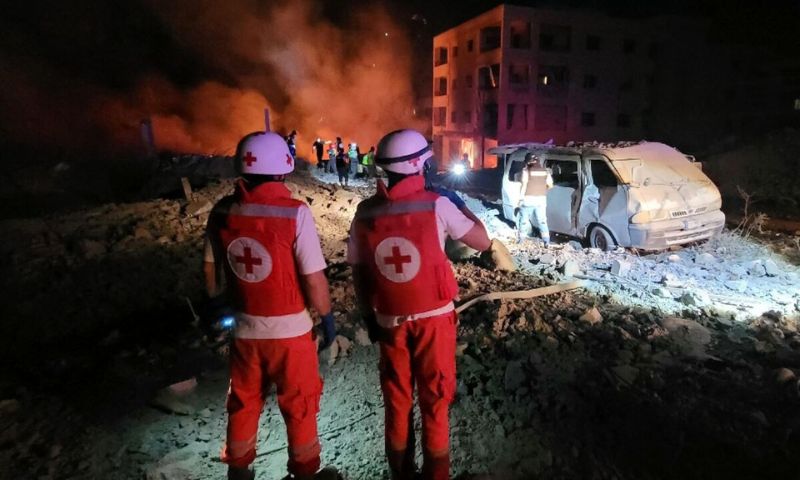BEIRUT: Israel launched strikes on Hezbollah’s stronghold in southern Beirut and the city of Nabatiyeh on Wednesday after Israeli Prime Minister Benjamin Netanyahu rejected calls for a ceasefire with Lebanon.
The Israeli airstrikes on south Beirut marked the first attacks on the area in several days after a brief calm in hostilities. Israeli warplanes also bombarded Hezbollah positions in the city of Nabatiyeh, an area under the control of Hezbollah and its ally, the Amal Movement.
According to the Lebanese health ministry, six people were killed and 43 injured in the attacks on two municipal buildings in Nabatiyeh. Rescuers are still searching the rubble for survivors. The mayor of Nabatiyeh was among the dead, according to local officials, who described the strikes as forming a “belt of fire” around the area.
Lebanese Prime Minister Najib Mikati condemned the strikes, accusing Israel of deliberately targeting a meeting of the municipal council that was focused on city services and relief efforts. UN Special Coordinator for Lebanon, Jeanine Hennis-Plasschaert, urged the protection of civilians and civilian infrastructure.
Meanwhile, Hezbollah attacked an Israeli tank near a border village with a guided missile. Since late September, Israel has ramped up its attacks on Lebanon and even sent ground forces into southern Lebanon. According to the health ministry, Israeli attacks have killed over 1,356 people in Lebanon.
On Tuesday, Hezbollah’s deputy leader, Naim Qassem, reiterated calls for a ceasefire, while warning that the group would expand its missile strikes across Israel if the war continued. He affirmed Hezbollah’s position that no truce could occur in Lebanon unless the war in Gaza ends.
Israel has stated its objective is to establish a buffer zone along its border with Lebanon. The war has displaced at least 690,000 people in Lebanon, compounding the country’s crisis, according to figures from the International Organization for Migration.
Despite calls for de-escalation, Israeli Prime Minister Netanyahu remained firm in his opposition to a ceasefire. During talks with French President Emmanuel Macron, Netanyahu said that any ceasefire would fail to alter the security situation in Lebanon.
The United States, Israel’s primary arms supplier, has voiced criticism of Israel’s airstrikes in Lebanon. US State Department spokesman Matthew Miller said that Washington opposed the air campaign, particularly the way it has been conducted in Beirut.
US Secretary of State Antony Blinken and Defense Secretary Lloyd Austin also warned Israel that weapon deliveries might be withheld unless more humanitarian aid is allowed into Gaza.
Meanwhile, the humanitarian situation in Gaza continues to worsen, with the United Nations reporting severe restrictions on aid deliveries. Israeli forces have been engaged in a relentless assault on northern Gaza.























